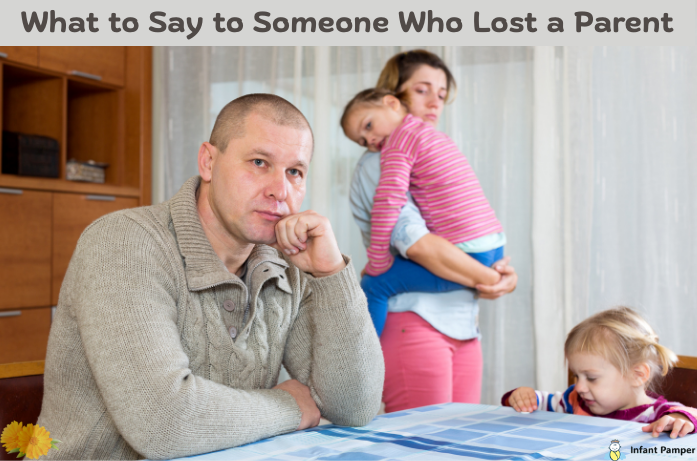By Infant Pamper Team
If ever a parent dies, even an acquaintance, the world suddenly seems quiet. In our collective response to the news, the person’s sorrow seems so much heavier than it actually is. When we come to know the news of new parenthood, the situation can get even more complicated. Now you are dealing with the overwhelming world of a new child and on top of that dealing with the overwhelming world of a new loss. You might be questioning, “How do I be there for my child when all my attention is on him? How do I speak that will not worsen the situation?”
This is a situation where the right words are absent. As we all know, grief is a journey that no one else gets to a deeply personal one, and there is no wondrous way to mend it. However, a lot of times, the issue is not what you say, but the authenticity of your heart to be there and the intention behind your words. This guide is meant to enable you to tackle a difficult conversation with empathy and assurance, and gives useful suggestions and lovely illustrations that can impact tenderly.
Why Words Matter (Even If They’re Not Perfect)
Grief has no script, so do not expect conversations around it to follow one. You are not required to say anything profound or text-book-ready; simply say something from your heart. Sometimes, the simplest words, spoken sincerely, can convey a feeling of being seen and supported to the bereaved. Help Guide.
The loss of a parent can shatter a person to its core. Parents often feel like our emotional grounding. When they are taken away sometimes, it feels as though one is adrift. During such times, a little gesture wishing a text, a word of kindness, or a quiet “I’m here” might actually do more than comfort. It is not about drying tears or easing someone’s pain, but about reminding others that they are not alone.

What to Say, With Compassion and Confidence
Your words don’t have to be poetic or wise. They just need to be heartfelt. Here are categories of phrases that offer comfort and strength:
1. Acknowledge the Loss Clearly and Kindly
Simple, honest acknowledgments ground the grieving person. They verify what has happened and signify that you are not avoiding it.
- “I’m so sorry for your loss.”
- “That must be very hard on you.”
- “My heart goes out to you and your family.”
- “I can’t imagine what you’re going through, but I stand with you.”
Why it works: Simple, sincere acknowledgment validates their pain and shows you are not avoiding the subject. It helps them feel seen when so many shy away from grief.
2. Share a Thoughtful Memory (If You Knew the Parent)
An affectionate memory can be consoling and remind the person of their parent’s imprint on this world. If you’re unsure what to say, you can find ideas from organizations dedicated to grief support, such as My Grief and Loss.
- “Your mom always had the kindest smile. I’ll never forget the way she made everyone feel welcome.”
- “I still remember that story your dad told at your baby shower; we were all laughing so hard.”
- “She made lovely tea and she really knew when someone needed to talk.”
Why it works: Reminiscing preserves the memory of their loved one and reminds them that the parent did impact other lives. It also gently opens doors for a little bit more connection and conversation.
3. Giving Specific Help
Grief saps people of all emotional and physical energies. Do not give them any decisions to make. Rather help them without having them make a request:
- “I am preparing a casserole for dinner on Thursday. Would you like me to drop some off for you?”
- “Would you like me to watch the baby while you take a nap?”
- “I am going grocery shopping. Would you want me to pick up something for you?”
- “Would it help if I watch the kids while you attend the memorial service in peace?”
The reason it works: Grieving people are often very overwhelmed to be able to ask for help. Specific offers take away that burden and give them real, immediate support when it is needed most.
4. Small Words, Great Effect
At times, a little silence and simplicity go a long way.
- “I’m here.”
- “Thinking of you today.”
- “You don’t have to say anything. Just wanted to check in.”
- “No words, just love.”
Why it works: Short phrases that offer presence and care do so without pressuring the one suffering. It sends to the individual that they are not alone, yet they do not even have to be ready to talk.
What Not to Say
Even well-meaning words can land wrong. Avoid these phrases:
- “They’re in a better place.”
- “At least they lived a long life.”
- “I know exactly how you feel.”
- “Be strong.”
- “Everything happens for a reason.”
These comments may feel dismissive or spiritualize their pain when they’re not ready for it. Instead, lean into humility. If you’re unsure what to say, say that. It’s more honest than pretending to understand.
Grieving While Parenting: A Unique Challenge
For new parents, life is already very overwhelming. So when you are barely able to manage yourself, how can you help someone who is grieving?
Tips for Supporting Others While Parenting
- Be kind to your limits. Maybe you can’t be there in person, but a voice message or a text that says “I’m thinking of you” can mean a lot.
- Show empathy. As a new parent, you’re already learning to be emotionally in tune. Let this guide your support for others.
- If it’s okay, involve your child. A baby’s smile, laugh, or even just their presence can be a small source of warmth in a difficult moment. Always ask first.
- Remember: small gestures go a long way. You don’t have to do everything, just do something.
When Words Aren’t Enough: Nonverbal Support
Sometimes, silence is golden. Nonverbal ways to support someone include:
- Dropping off a handwritten card or flowers.
- Sitting quietly beside them if they invite you in.
- Sending a simple care package or snack box.
- Lighting a candle in honor of their parent.
- Remembering key dates, like birthdays or anniversaries, and reaching out.
More Thoughtful ideas are also shared in guides like Lens of Jen – How to Comfort Someone Who Lost a Loved One.
How Kids Understand Grief
If the grieving person is your child’s grandparent, it is essential to gently and honestly speak to your child. Children process death differently, based on their age and emotional development.
Supporting Your Child Through a Loss
- Use simple, clear language: “Grandpa died. That means that his body stopped working, so we can no longer see him.”
- Allow them to ask questions, even if they feel repetitive.
- Keep routines as stable as possible; predictability feels safe.
- Offer outlets for expression: Drawing, storytelling, or building a memory box can help kids work through their feelings.
According to Child Mind Institute, grief in children often mirrors their environment. If you model openness and emotional presence, they will learn to grieve in healthy, constructive ways. UNICEF also provides practical advice on how to talk to children about the death of a loved one.
Supporting a Grieving Partner
When the co-parenting partner loses maybe a parent, sequences of friction are sent off through the relationship. They might become withdrawn, get short-tempered, or become emotionally unavailable.
Support them by:
- Giving them their space but without withdrawing. Let them know you are available for them emotionally.
- Helping out with household duties or childcare.
- Being patient. Grief is not linear.
- Suggesting a professional helper when the grieving becomes unbearable.
When Grief Becomes Too Much
Grief is natural, yet it can become depression or chronic emotional distress in certain cases. Watch out for all these outward signs:
- Sadness that overstays its welcome for months on the end
- Isolation from the rest of the world or disinterest in daily life
- Substance abuse and its avoidant behaviors
- Excessive anger or hopelessness
Seeing your loved ones with such symptoms might be a clue to encourage professional help.
Trusted, research-based resources:
Disclaimer: This article is for informational purposes only and not a substitute for medical or psychological care. Please consult a licensed professional if you or someone you know is struggling with grief.
Teaching empathy through everyday moments
Your child is always looking to you. If you’ve ever met someone who is in pain and your response to that situation has been one of tenderness, understanding, and acceptance, this becomes a perfect example of their emotional toolkit.
Are you writing a sympathy card? Are you holding space for a friend in a time of distress? Are you simply saying, “I’m here”? These are tools for teaching someone empathy. This child will have the big goal in his heart to learn how to help friends in times of distress.
That’s a meaningful legacy!
FAQs
Q1: Beside announcing the death, would you have anything else to say?
The shorter and simpler, the better: “I am so sorry for your loss.” An honest acknowledgment will certainly mean more than silence.
Q2: What would be some statements you would avoid for a grieving friend?
“In a better place,” “Be strong.” These can diminsh their feelings.
Q3: How can I be there for someone while managing my own duties with regard to parenting?
When you just can’t make it to a gathering, little things-one quick text, dropping off food-mean a lot.
Final thoughts
Grief: messy, unpredictable and deeply personal. You won’t handle it right every time, and that’s okay. It’s the effort that counts. At Infant Pamper, we believe that love is shown not only in the big moments, but also in the small moments of comforting those who are suffering.
You don’t have to worry about finding the right words. If you offer your whole heart, your presence, and your willingness to stay a little longer with someone along the long and winding road of grief, that is enough.
💡 At Infant Pamper, we believe parenting is all about supporting each other through every stage of life. If you found this article helpful, feel free to check out more of our guides on navigating parenthood with kindness and understanding.




